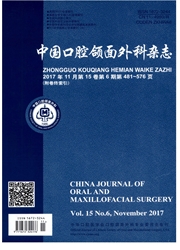

 中文摘要:
中文摘要:
目的:将ERK/MAPK信号通路抑制剂苯乙酸钠(NaPA)作用于PLAG1转基因小鼠唾液腺肿瘤,观察其对肿瘤生长的影响。方法:将30只肿瘤小鼠随机分为3组,分别给予NaPA最大非致死剂量、一半最大剂量及同体积生理盐水。给药结束后,收集肿瘤组织.观察其病理学特征并通过转录和翻译水平检测MAPK相关基因ERKJ1/2、ph—ERK1/2、cvclinD1的表达量,利用SPSS19.0软件包对3组结果进行单因素方差分析。结果:NaPA处理过的小鼠肿瘤生长明显受到抑制。且细胞无异常核分裂像,性质趋于良性。MAPK相关基因磷酸化ERK1/2、cyclinD1蛋白水平表达量较对照组减少,差异有显著性(P〈0.05),但非磷酸化ERK1/2的RNA和蛋白水平表达均无显著差异(P〉0.05)。结论:NaPA可以通过抑制ERK/MAPK通路阻碍唾液腺肿瘤的生长,使细胞增殖减少,有望用于唾液腺肿瘤的药物治疗。
 英文摘要:
英文摘要:
PURPOSE: To evaluate the effect of sodium phenylacetate (NaPA), the ERK/MAPK signaling pathway inhibitor, on the growth of salivary gland tumors in PLAG1 transgenic mice. METHODS: Thirty mouse with tumors were randomly divided into three groups: the first group received the maximum non lethal dose NaPA, the second group received half the dose of the former, and the third group received normal saline (NS) as the control. The tumor tissue was collected after the medicine to observe pathological features and detect the expression of ERK1/2, ph-ERK1/2, cyclin D1, which were the MAPK related genes, both in transcription and translation level. Statistical differences between groups were determined by SPSS 19.0 software package with one-way ANOVA. RESULTS: The salivary gland tumors treated with NaPA, which tended to be benign, were significantly suppressed with no abnormal mitotic cells. The expression of ph- ERK1/2 and cyelin D1 protein decreased compared with the control group, the differences were statistically significant (P〈 0.05). However, no significant differences from the transcriptional and translational levels of ERK1/2 expression were found using One-way ANOVA (P〉0.05). CONCLUSION: NaPA played an important role in suppressing the growth of salivary gland tumors in PLAG1 transgenie mice by inhibiting the ERK/MAPK signaling pathway. Thus, it might beapplied to the treatment of salivary gland tumor. Supported by National Natural Science Foundation of China (30772432).
 同期刊论文项目
同期刊论文项目
 同项目期刊论文
同项目期刊论文
 Oral and maxillofacial desmoid-type fibromatoses in an eastern Chinese population: A report of 20 ca
Oral and maxillofacial desmoid-type fibromatoses in an eastern Chinese population: A report of 20 ca 期刊信息
期刊信息
